- Home
- Marina Oliver
The Cobweb Cage
The Cobweb Cage Read online
THE
COBWEB CAGE
BY
MARINA OLIVER
Marigold Smith, born into the small mining town of Hednesford, is devoted to her family, especially the small and delicate Ivy, for whose accident she blames herself. She is determined to try and make life easier for Ivy and her middle sister, Poppy, as well as her hard-working parents.
When she is given the chance of going into service in Oxford she meets the wealthy and charming Richard Endersby, whose father owns a factory in the Potteries. Despite the differences of class, education, and background they fall in love. Then comes the Great War, and Richard, a qualified pilot, joins the army.
He is reported missing, Marigold's family is struck by tragedy, and she has to make an agonising decision in order to be able to help them. Through her they can escape from poverty and she can build a business to support them all.
Reviews of The Cobweb Cage
'A riveting, pacy read' - Emma Blair
'The Cobweb Cage is very atmospheric and the intriguing story never falters. This is a story that won't let you go, filled with people and places you recognise with your inner eye, and situations that are at once familiar and surprising' - Susan Sallis
'I enjoyed this well-researched book immensely - ideal escapism on a cold wet day' - Anita Burgh
'An absorbing family saga with a splendid cast of characters' - Annabel magazine
'I hope a sequel is planned' - SWWJ
The Cobweb Cage
By Marina Oliver
Copyright 2016 Marina Oliver
Smashwords Edition
The moral right of the author has been asserted
Cover Design by Debbie Oliver
All rights reserved. No part of this book may be reproduced or distributed in any form, including digital and electronic or mechanical, without the prior written consent of the Publisher, except for brief quotes for use in reviews.
Smashwords Edition, License Notes
This ebook is licensed for your personal enjoyment only. This ebook may not be re-sold or given away to other people. If you would like to share this book with another person, please purchase an additional copy for each recipient. If you are reading this book and did not purchase it, or it was not purchased for your use only, then please return it to Smashwords.com and purchase your own copy. Thank you for respecting the hard work of this author.
Print editions published 1994 by Michael Joseph, 1994 Signet, 2000 Pan, 1995 Magna
See details of other books by Marina Oliver at
http://www.marina-oliver.net.
Author Note
After I had written short historical novels set mainly in the seventeenth century, Regencies under a pseudonym Sally James, and contemporary novels under other pseudonyms, I wanted a change, and decided to try my hand at a regional saga.
I was born in Walsall so I chose the Black Country and Birmingham as the background. For The Cobweb Cage I needed a mining town, and Hednesford seemed the most appropriate, particularly as it had not had the heart ripped out of it like so many other towns. I hoped readers would be able to recognise it.
The novel was to be set during the first couple of decades in the twentieth century, so I had a lot of research to do. What I found most useful were the local newspapers of the time, especially with their advertisements; Directories which gave details such as names of the inhabitants and shopkeepers, when and where the mail was collected, and bus timetables; and books of old photographs. I was fortunate as Staffordshire libraries had published books about the coal industry, education, and railways, and what was particularly useful, a collection of miners' memories.
Marigold's house is like the one my grandparents lived in, and I refreshed my memories by visiting the wonderful Black Country Museum.
There was a lot more to read, and I explored the town, Cannock Chase, and for later parts of the book, Oxford and Birmingham. As the action also covered the First World War, I read about that too.
Writing a saga involved learning new techniques, as the books were longer and I had more characters to direct, and their stories to incorporate in the main plot. There was Marigold, her two younger sisters and her brother, their parents, and, because this is a romance too, the hero. I hope you enjoy reading it in this new and exciting e-book format.
THE COBWEB CAGE
BY
MARINA OLIVER
Chapter 1
Marigold squatted on the edge of the fender, huddled as close as she dared to the banked up fire. Despite the heat from the coals which warmed her face and chest, and her thick flannel nightgown she shivered uncontrollably. Twisting round to warm her back, she clutched her thin arms about her body in a vain attempt to dispel the bewildered emptiness within her.
When would Johnny come home? What would Pa say if he came home to find the table still littered with dirty plates, and no dinner cooked?
At this thought she shook still more. Pa loved them. He wasn't cruel, not like Mr Potter next door, who took off his belt to thrash Fred and Tom and little Betty for the slightest offence, and could be heard through the thin walls beating his wife regularly every Saturday night when he staggered home from the Cross Keys.
Pa only smacked them when they'd been very naughty. And he'd never smacked Mom. But it was naughty not to have dinner ready for him. Mom said that, so would he smack Mom? Slow tears began to slide down Marigold's plump, rosy cheeks. Her tears, and thoughts of dinner, made Marigold sniff. She longed for the comforting smells of the stew her Mom normally kept simmering in the big black pot, but today the pot was empty.
She was cold, bewildered, and hungrier than she could ever remember. The chenille curtain was caught up on a nail instead of falling over the door, and a bitter cold draught whistled through from the scullery. She wanted Mom, but Mom was upstairs, and someone upstairs was groaning, occasionally crying out with pain.
'When can I have my breakfast?' she'd timidly asked Mrs Whitehouse on one of her sudden appearances hours ago.
'Don't myther me now, chick. I need this quick,' Mrs Whitehouse replied fretfully, swinging the trivet out from above the fire. She lifted the huge kettle and poured boiling water into the old tin ewer. Then she refilled the kettle in the scullery and heaved it back onto the trivet.
'Goo an' find a noggin fer yoursen, an' keep out me way,' she said over her shoulder, disappearing through the narrow doorway and clumping up the stairs.
Marigold shivered even more. The bread was in the dark, dismal pantry under the stairs, and Johnny had whispered to her one night in bed that wolves hid there in wait. She dared not venture into the pantry. She'd rather die from hunger than let wolves eat her.
She wasn't entirely sure what wolves looked like, except they were bigger and fiercer than old Mr Farraday's dog, Towser.
Towser growled and snarled at everyone who walked past his house, and all but the bravest or most foolhardy children went the long way round rather than pass that gate. It had been left open once and Towser escaped. He'd bitten Joe Tasker, the biggest man in the street, and Joe had been off work for a month, Pa said. If wolves were worse than Towser they must be dangerous, terrifying creatures.
Marigold sighed, and rubbed her eyes with the edge of her nightgown. She would just have to stay hungry until someone came to help her. Johnny might be home from school soon.
But he'd jeer to find her still in her nightie. Another tear slid down her cheek. It really wasn't her fault. They wouldn't let her get dressed. Mrs Whitehouse had shouted at her when, feeling guilty at her unwashed, uncombed state, her nightie unbuttoned, she'd tried to creep upstairs to fetch her clothes.
Bewildered, she thought back over the very peculiar day. What had she done to make everyone forget her? It had started when
Mom, instead of dressing her as usual, crept back into bed after giving Johnny a piece of bread and dripping, packing up another for his dinner, and sending him off to school.
Half an hour later as Marigold, puzzled and frightened, had been sitting quietly on the end of the big bed, Mom had gone stiff and cried out.
'Go and fetch Mrs Tasker!' she gasped.
'I haven't got my frock on,' Marigold said, shocked. You never went out into the yard in your nightie, not even to the lavatory.
'Put my shawl round you, but mind you don't trip. Hold it up.'
Mary Smith paused and closed her eyes, biting down on her lower lip to suppress the pain. After a minute the spasm passed and she smiled weakly at Marigold.
'Can you pull your boots on by yourself? They're in the scullery where Pa blacked them last night. Don't try to fasten them. And don't wait to put stockings on. Marigold, be a good girl and go quickly!'
Terrified by the groans her mother didn't seem able to suppress, Marigold fled. She forgot the shawl and discarded the boots when they proved too tight for her trembling hands. She ran barefoot through a thin sleety drizzle towards the end house of the yard, crying so much she couldn't speak coherently.
Mrs Tasker seemed to know what was wrong, however. Pausing only to throw a few words over her shoulder to someone in the house, she waddled as fast as her considerable bulk allowed along the path between the houses and gardens, and vanished up the narrow stairs.
Marigold had seen her no more, and didn't dare go upstairs to discover what was happening.
After a while Mrs Tasker called down to her.
'Run an' fetch Mrs Whitehouse, quick,' she ordered, and once again Marigold fled, too frightened by now to object to going down the narrow ginnel and across the street in her nightgown in the middle of the day. She was past caring whether people saw her and laughed.
Then there had been nothing but Mrs Whitehouse's forays downstairs. Nothing to hear from the bedroom apart from the occasional groan, and once a high, piercing scream. Too terrified to think clearly, Marigold shrank into herself, shivered, and gave the occasional hiccuping sob.
But hunger gradually overcame her other fears. There was bread in the pantry. Johnny had put it away while Mom smeared the dripping on his piece, and he hadn't pushed the door to. She could see the slight gap. She'd be able to open it without fetching a stool to reach the latch. If she left the door open surely she'd be safe. Wolves didn't like the light.
Marigold glanced anxiously out of the window. The short winter day was almost over and darkness would soon fall. If she wanted to eat she'd better brave the pantry now or daylight would have gone.
Slowly, fearfully, she rose from her cramped position and took a couple of steps across the room. Then two more. A short run and she was grasping the edge of the door, which hadn't been properly closed. Trembling, Marigold pulled it open further and peered inside.
There didn't seem to be any wolves, or none she could see. The loaf was in the cracked old earthenware bread crock which had belonged to her granny. Marigold was reaching for it when she became aware of a far more enticing smell.
She licked her lips. On the slate shelf was the remains of a meat pasty. Now she remembered Mom saying last night she didn't feel hungry and would finish the pasty later, when the children were abed.
Tempted, Marigold stretched out her hand. A sound from above made her pause. The hesitation gave her time to think. The pasty was Mom's, she'd had her own share of half a one last night. It would be stealing to take this. As hunger battled with conscience, and Marigold's hand reached slowly, inevitably, towards the pie, she heard Mrs Tasker's voice in the kitchen behind her.
' 'Er'll do now. But I asks yer, what an ockerd name!'
'Daft, in' it. But childbirth meks some women befumbled.'
' 'Er wants the gels called after flowers! Says wi' a name like Smith they need summat diff'rent.'
Mrs Whitehouse sniffed. 'Allus did think too much on 'ersen. If 'er wants flowers why not summat dacent like Rose or Daisy or Lily then? Instead o' some 'ighfalutin' 'eathen name. Mark my words, 'er'll regret it!'
Marigold heard but understood nothing. She was petrified of being caught stealing from the pantry. There wasn't time to get out. What could she do? In desperation she tried to pull the door to. They might not notice it was open. She hovered, balanced precariously on the narrow step inside the door, clinging to the crossbar, all fear of wolves for the moment banished from her mind.
'Where's that dratted Marigold got to? Out in fode, playin', desay. Well, 'er'll cum back when er's clemmed. I've got my Joe's tea ter get, an' these 'ere sheets ter put in soak.'
Mrs Tasker heaved the bundle of sheets past the pantry door. Her superfluous fat brushed against it, and it swung to. As the latch clicked home Marigold lost her perch and fell down the steep step into the black hole, landing with a thump on the sack of potatoes which was propped against the tub of salted beans.
She let out a shriek of alarm, but the door was made of thick planks and Mrs Whitehouse was laughing, a loud, raucous guffaw. No-one heard the child sobbing convulsively at her sudden terrifying descent into this dark hole, a place she dreaded even in the brightest daylight.
For an unknown length of time Marigold lay where she'd fallen, quivering with anguish. Johnny had locked her in once when she'd plagued him to take her out to play with his friends, and she knew she couldn't hope to open the latch. It was high on the door, way beyond her small reach even without the high step, and that was too narrow to stand on when the door was fully closed.
Eventually she lay quiescent, almost asleep, but then she heard a low rumbling noise. Wolves! They were coming for her! It was like a dog's growl but many times worse. How big were wolves? Would they swallow her whole like the whale had swallowed Jonah? Or would they nibble her bit by bit, as Johnny said rats ate people?
It was too much. Marigold began to scream hysterically, beating her puny fists against the unyielding door until a blessed oblivion overtook her. She slid down onto the floor, her arm trailing over the side of the egg bucket, her hand in the opaque, sticky water-glass.
*
It was Johnny who found her when he arrived home from school. Without a thought about where his mother and sister were, or why the house was in darkness, he discarded his jacket and cap in the scullery. Then he lit a candle and leaving it carefully on the chest nearby, plunged into the dark pantry in search of food. Bread and dripping hadn't been enough for dinner, and anyway Johnny was always hungry.
He yelled with fear when Marigold, disturbed from her stupor by the opening of the door and the gleam of candlelight, raised her wet sticky hand and clutched at his ankle. All he could see, as he explained repeatedly to his father later, was a ghostly shape rising from the floor and coming towards him.
When Marigold cried out to him and he realised his mistake, his fear was followed by anger at having been for a moment afraid. At five years and six months he was one of the biggest boys in his class at school. Because of that and his fiery temper he was rarely teased, and prided himself on his toughness. It was shaming to have been scared by Marigold in her nightie.
In the midst of the succeeding tumult, with Marigold sobbing her relief and Johnny venting his anger in loud scolding, they heard Mary's voice.
'Where's Mom?' Johnny demanded, his fury forgotten. 'Why were you locked in?'
'She's been in bed all day. I don't know why. Mrs Whitehouse was here. They shut the door and I couldn't get out,' Marigold gasped through her sobs, but Johnny didn't stop to hear more.
He caught up the candle and holding it carefully, went upstairs as fast as he could. Marigold, terrified of being left in the dark again, followed.
Mary lay in the big bed in the front room, dark shadows under her eyes. An oil lamp had been placed on the washstand and cast a soft glow through the small room. Marigold saw that the bottom drawer of the big chest, the only other item of furniture in the room, was wide open, but she didn't stop to
wonder why. Her sobs renewed, and she flung herself onto the bed to feel her mother's arms close about her, warm and comforting.
Mary gradually persuaded her to tell what had happened while Johnny, more curious than his three-year-old sister, got bored and went to look in the drawer.
'A baby!' he exclaimed. 'Is it a boy? Can he play football?'
Mary shook her head and Marigold, now calm and ensconced safely and warmly within her arms, thought how pretty her mother was when she smiled.
'It's another little sister, Johnny. Hyacinth, she's called. Isn't that a pretty name?'
'Never heard it. There's no one called Hy – whatever, at school.'
'It's the name of a flower, like Marigold. A blue flower, it is sometimes, and blue's my favourite colour. I want all my little girls to be called after flowers.'
'Johnny isn't a flower. I'm called after Pa. Boys aren't called after flowers,' Johnny said, a tinge of anxiety in his voice.
Mary laughed. 'You're the eldest, it's only right you should be called after your father. Now be a good lad and get Marigold some tea. She's had nothing all day, poor mite. She can have that pasty, and can you cut some bread without cutting yourself?'
'Course I can.'
Proud of his responsibility Johnny clattered down the steep stairs. Marigold, fear and hunger forgotten, crept over to gaze with awe at the tiny red face of her new sister, crowned with red curly hair.
'She's pretty,' she breathed softly, her heart bursting with love for this tiny doll of a creature. 'Can I help look after her?'
'Of course you can, Marigold. But first go and get your clothes. And bring me the comb.'
It felt strange to be washing and dressing at the wrong end of the day, but Marigold didn't care. She had a new sister, another girl to play with, to look after and to love. When she went down into the kitchen to eat the pasty and the inexpertly hacked pieces of bread and dripping Johnny had prepared, she felt it had almost been worth while being locked in the pantry.

 Rebel Heart
Rebel Heart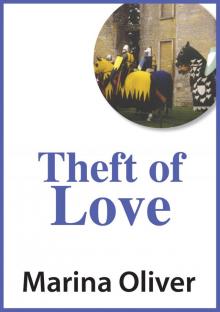 Theft of Love
Theft of Love Courtesan of the Saints
Courtesan of the Saints Fatal Slip
Fatal Slip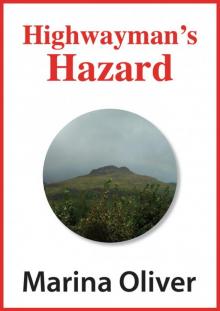 Highwayman's Hazard
Highwayman's Hazard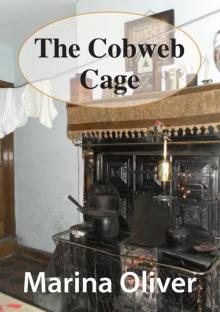 The Cobweb Cage
The Cobweb Cage The Irish Bride
The Irish Bride Apple Blossom Bride
Apple Blossom Bride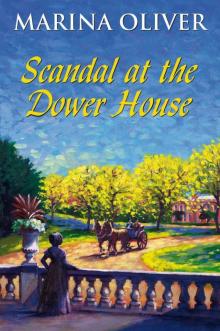 Scandal at the Dower House
Scandal at the Dower House Eugenie and the Earl
Eugenie and the Earl Her Captive Cavalier
Her Captive Cavalier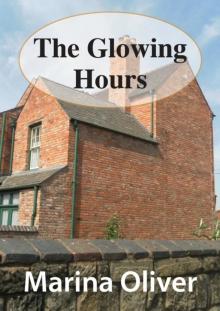 The Glowing Hours
The Glowing Hours Sibylla and the Privateer
Sibylla and the Privateer The Baron's Bride
The Baron's Bride Player's Wench
Player's Wench Gavotte
Gavotte The Chaperone Bride
The Chaperone Bride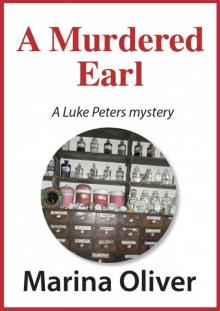 A Murdered Earl
A Murdered Earl Charms of a Witch
Charms of a Witch Convict Queen
Convict Queen The Accidental Marriage
The Accidental Marriage